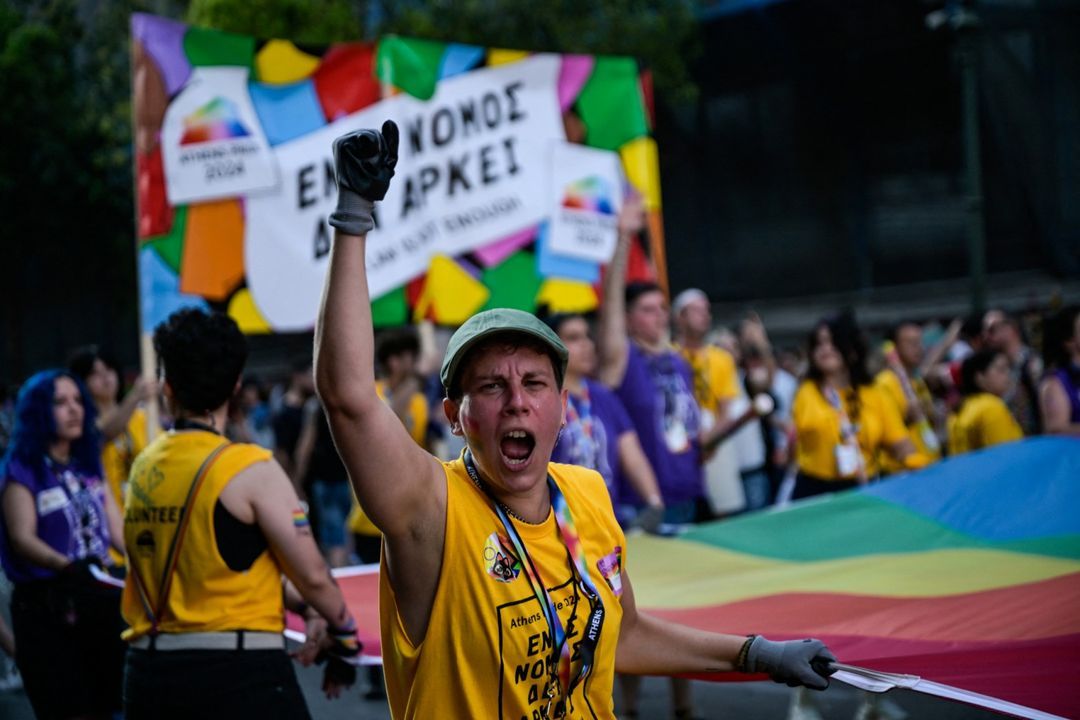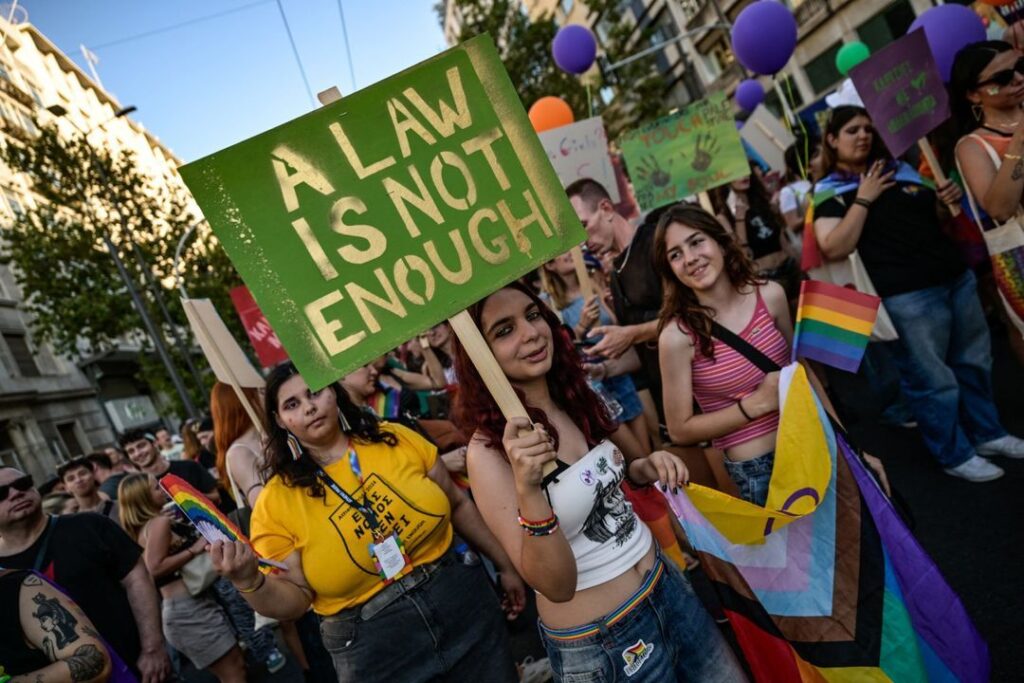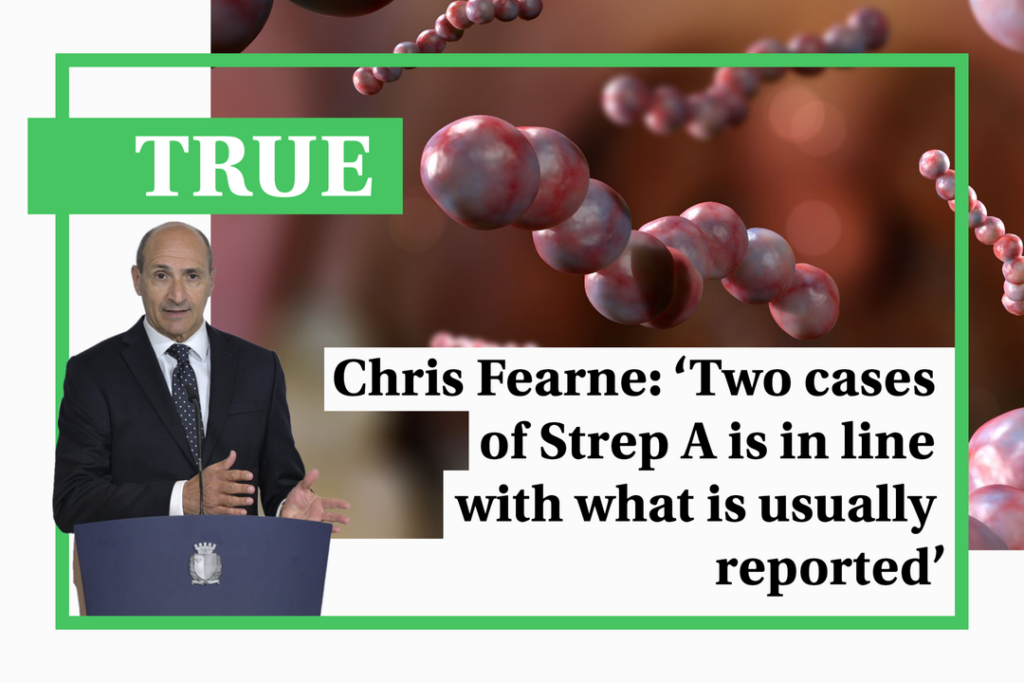A torrent of online abuse and disinformation has soured a breakthrough year for Greece’s LGBTQ activists as the country hosts Europe’s biggest Pride celebration for the first time.
Tens of thousands have flocked to the northern city of Thessaloniki for EuroPride between June 21 and 29, after Greece became the first Orthodox Christian country to legalise same-sex marriage and adoption in February (archived here).
Organisers say Thessaloniki was chosen to host the event as a symbol of LGBTQ unity in the face of significant challenges and expect 30,000 people to participate.
But LGBTQ activists say a banner year for their legal rights has come with a harsh backlash online marked by an uptick in hate speech and misleading claims proliferating on social media.
The LGBTQ movement in Greece “does not have as straightforward and automatic acceptance as in western and northern Europe”, Apostolis Karampairis, director of Thessaloniki Pride, told AFP.
Maria Katsikadakou, a longstanding lesbian activist, said hate speech was spreading online unchecked, with those expressing homophobic views “an increasingly large part of society”.
Despite Greece’s progress, “we still have many struggles ahead,” she said.
Non-traditional families targeted
The law passed in February extended full parental and adoption rights to same-sex couples.
AFP’s Fact Check team has identified several misleading claims circulating on social media that seek to portray the rights of same-sex parents as being unfairly imposed on Greek society.
The idea that LGBTQ people forming families constitutes a threat to the “traditional” family is also prevalent in misinformation identified and fact-checked by AFP.

A viral claim on Facebook began spreading after Greek Prime Minister Kyriakos Mitsotakis announced the same-sex rights bill in January, alleging that Greek dairy company DELTA had removed the figure of a mother from a family portrait on a milk carton (archived here).
The assertion that the company excluded heterosexual family representations from their marketing was false, as the carton showing a father and daughter together was just one in a range of new designs.
The International Lesbian, Gay, Bisexual, Trans and Intersex Association in Europe has tracked rising hatred towards the trans community in Greece online over the last year.
Their annual review found “a stark increase in transphobic statements and hate speech from public figures and politicians across Europe, including Greece”, spokeswoman Katja Stefanec Gartner said.
The report noted that hate speech from political and religious leaders in Greece remains a significant problem, citing a group of Orthodox priests who issued a joint statement against marriage equality and labelled same-sex relationships as a “perversion”.
Despina Chronaki, a journalism lecturer at the University of Athens, said the powerful Orthodox Church saw LGBTQ people as a “threat” to the dominant heterosexual norm, which influenced the wider culture.
“The debate and the passing of the (same-sex marriage) bill has intensified discussions in the wider public sphere and hate speech against LGBTQ people,” she told AFP.
Meanwhile, a spate of social media posts misleadingly compared a recent referendum in which Irish voters rejected constitutional changes to the definition of family and women’s “duties in the home” to Greece’s same-sex marriage and adoption law.
Although Ireland did not adopt the changes, same sex-marriage has been legal there since 2015.
Rainbow flag ‘imposed’ on hotels
Other false claims were linked to Greece’s government attempting to extend a more welcoming attitude to LGBTQ tourists this year. The Ministry of Tourism recently issued guidelines to hotels, which included the suggestion of flying the rainbow flag.
This was distorted in social media posts that declared the Greek government had issued an “order” to fly the LGBTQ flag.
An analysis shows this runs contrary to the wording in the guidelines and was denied by the Hellenic Chamber of Hotels.
Most of the allegations were widely shared by individuals and politicians from conservative political parties and Orthodox circles (for example here).
They included Kyriakos Velopoulos, president of the nationalist Greek Solution party, and Afroditi Latinopoulou, head of the ultra-nationalist Voice of Reason party and recently elected to the European Parliament.






